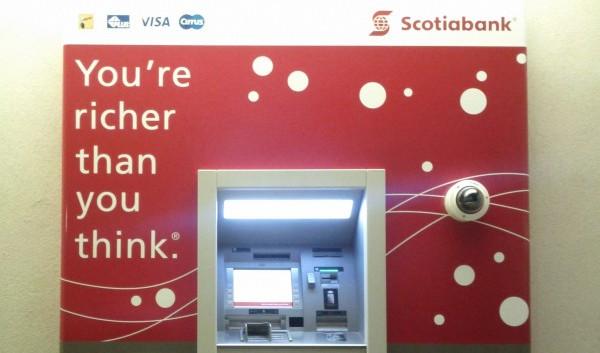rabble is expanding our Parliamentary Bureau and we need your help! Support us on Patreon today!
On December 2, the Canadian Press reported that the Royal Bank was noticing the “first signs of oil price trouble.” The headline framed the rest of the story: the stories of doom within the financial sector due to the low price of oil are finally coming true.
The Globe and Mail‘s lede had a similar warning: “For the first time ever, a Canadian company has broken the $10 billion annual profit barrier. But beneath the surface of Royal Bank of Canada’s 2015 earnings are troubling signs that growth in the Canadian banking sector is slowing to a crawl.”
The proxy warning sign is an increase in missed monthly auto and credit card payments, likely due to higher unemployment in Alberta. Mark Hughes, RBC’s chief risk officer told CP that the trend is “slight — and I would repeat the word slight.”
What wasn’t slight, however, were RBC’s annual profits: another record-breaking year. RBC lead the pack with a profit of $10,030,000,000 for 2015 — and the other banks weren’t too far behind.
Part of this profit was thanks to “a favourable tax adjustment,” said John Aiken, a Barclays analyst in the CP story, and eliminating up to 900 positions, according to The Globe and Mail. Another story from CP warns that these record profits, a total of $34,880,000,000 for the six major banks, might not be a trend that continues. Aiken warned that 2016 could be a difficult year.
The second CP story had this, eye-popping quote, “‘It wouldn’t be fair to characterize it as a disaster, but the earnings quality is clearly deteriorating,’ said Edward Jones analyst Jim Shanahan, calling such one-time gains unsustainable.”
The CBC reported that both TD and Scotiabank cut nearly 2,700 staff in the past six months. Their story also suggests that increased service fees and interest rates have added to the profit, though the article doesn’t say by how much. The CBC rebounds to say that the future isn’t necessarily rosy for the banks and they also quote Aiken, who repeats his mantra: 2016 could be challenging.
In a remarkable case of paint-by-numbers, CP’s 2014 Q4 profit story made the same warning: “Canada’s top banks saw their fourth-quarter profits edge higher this year, but they warned that a slew of headwinds — including the sluggish global economy, a slowdown in consumer lending and volatility on the stock markets — will make the year ahead challenging.” The headwinds analogy appeared in the CBC’s 2015 sub-heading. The image used in CP’s 2014 story is the exact same that ran with CP’s 2015 story.
And, the same mix of pessimism and profit cheerleading formed CP’s 2013 headline too: “Canadian big banks post record profits in 2013, but outlook raises concern”
Imagine how different these reports would be if they asked better questions: how much money are Canadians coffers losing because of tax adjustment? How much are RBC employees being paid? What has the impact of nearly 4,000 job cuts had on communities and individuals? Why isn’t $34 billion in profit seen as grotesque and abhorrent?
The Royal Bank employs 79,000 workers, both full-time and part time. It’s no coincidence that the first Canadian company that broke $10B profit in a single quarter ever is in an industry that is not unionized. With no wealth distribution mechanism, there’s no formal employee pressure to disburse the wealth and so wealth simply accumulates.
Add to that lower business taxes, which the Royal Bank and Scotiabank both cite as being part of the story for why profits are higher, it starts to paint a grim picture: these profits don’t form from thin air. They represent salary decisions at the banks (or job cuts) and lost money from the public purse. Meanwhile, politicians repeat the mantra of austerity, that there just isn’t enough money, ad nauseam.
This is perhaps the most damaging part of how the mainstream media covers bank profits. Journalists routinely gloss over what goes into generating these profits and the banking industry’s cries of doom are amplified rather than reporting in the public interest.
In absence of public pressure to reign in these profits, Canadians will see more and more of their income going to line the pockets of the ultra rich.
rabble.ca requested information on average and entry-level wages at the Royal Bank. A representative of the bank could not provide details.
rabble is expanding our Parliamentary Bureau and we need your help! Support us on Patreon today!



